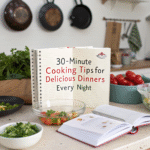Introduction
So, you’ve decided to start cooking at home. Maybe you’re tired of takeout. Maybe you’re looking to eat healthier, save money, or just feel more in control of your meals. Whatever your reason, welcome to the kitchen!
But let’s be honest: starting from scratch can feel overwhelming. With so many recipes, gadgets, and techniques out there, where do you even begin? The good news? You don’t need to know everything. You just need to start simple.
This guide is made especially for beginners who want to feel comfortable and confident in the kitchen. These easy kitchen tips will save you time, reduce stress, and help you enjoy the process of cooking (yes, it can actually be fun). Let’s dive into the basics and get you cooking in no time.
1. Set Up Your Kitchen Smartly
Before you cook anything, take a few minutes to organize your space. A clutter-free kitchen helps you focus, find tools quickly, and move around more efficiently.
Key Tips:
- Keep your most-used tools (knife, cutting board, spatula) within easy reach.
- Store spices, oils, and seasonings near the stove.
- Clear your counters before you start cooking.
Pro Tip: Use drawer dividers and shelf organizers to maximize space and reduce stress.
2. Stock Your Pantry with Basics
Cooking is way easier when you have staple ingredients on hand. A well-stocked pantry saves trips to the store and gives you flexibility.
Pantry Essentials:
- Dry: rice, pasta, canned beans, flour, sugar
- Sauces: soy sauce, tomato paste, broth cubes
- Spices: salt, black pepper, garlic powder, oregano, chili flakes
- Oils: olive oil, vegetable oil
Pro Tip: Build your pantry slowly. Add one or two items per week.
3. Invest in a Few Quality Tools
You don’t need a kitchen full of fancy gadgets. A few solid tools go a long way.
Must-Haves:
- Sharp chef’s knife
- Nonstick skillet
- Saucepan
- Wooden spoon
- Cutting board
- Measuring cups and spoons
Pro Tip: Choose quality over quantity. A good knife beats five dull ones.
4. Master Basic Knife Skills
Chopping, slicing, and dicing are at the core of most recipes. Knowing how to handle a knife safely and efficiently saves time and frustration.
Knife Safety Tips:
- Always use a cutting board
- Tuck your fingers inward (claw grip)
- Keep your knife sharp
Pro Tip: Learn how to dice an onion, mince garlic, and chop herbs — it’s easier than it sounds.
5. Start with Simple Recipes
Don’t aim for gourmet on day one. Focus on easy, one-pot, or five-ingredient recipes.
Great Beginner Meals:
- Pasta with garlic and olive oil
- Scrambled eggs or omelets
- Stir-fried rice or veggies
- Soup using broth, vegetables, and noodles
Pro Tip: Repeat a recipe 2–3 times to build confidence and improve speed.
6. Learn to Read a Recipe
Reading a recipe is like reading instructions. Do it all the way through before starting.
What to Look For:
- Prep time and cook time
- Equipment needed
- Ingredient list and steps
Pro Tip: Lay out ingredients in the order they’ll be used. It keeps you organized.
7. Taste As You Cook
Flavor is built gradually. Don’t just rely on the final step to fix things.
Tasting Tips:
- Sample sauces before serving
- Adjust salt, spice, or acid as needed
- Use your senses: smell, sight, and taste
Pro Tip: Keep a small spoon nearby to taste often.
8. Clean As You Go
The fastest way to hate cooking is to let dishes pile up. Cleaning as you go keeps your kitchen calm and saves time later.
Easy Clean-Up Habits:
- Wash utensils while food cooks
- Wipe spills right away
- Keep trash or compost bin nearby
Pro Tip: Fill the sink with warm soapy water and drop tools in as you use them.
9. Don’t Be Afraid to Fail
Every cook burns something, over-seasons, or forgets the rice. Mistakes are part of learning.
Remember:
- Not every dish will be perfect
- Learn from what didn’t work
- Keep a notebook of your kitchen wins (and fails!)
Pro Tip: Share your cooking journey with friends or family. It makes it more fun.
10. Celebrate the Little Wins
Made perfect scrambled eggs? That’s a win. Didn’t burn the toast? Another one. Celebrate your progress!
How to Stay Motivated:
- Take photos of your meals
- Try one new recipe per week
- Reward yourself for milestones (like a new tool or spice)
Pro Tip: Cook for someone else. Their smile will be the best feedback.
Frequently Asked Questions (FAQ)
Q1: What should I cook first as a beginner?
A: Start with meals that use few ingredients and simple steps — like scrambled eggs, pasta, or stir-fry.
Q2: How can I make food taste better?
A: Use salt and acid (like lemon juice or vinegar) to balance flavors. Don’t be afraid of seasoning!
Q3: How often should I cook to get better?
A: Aim to cook at least 3–4 times a week. Repetition builds skill and confidence.
Q4: What if I have a tiny kitchen?
A: Keep tools minimal, clean often, and use vertical storage (shelves, hooks, magnetic racks).
Q5: How do I stop wasting food?
A: Plan your meals, use leftovers creatively, and freeze ingredients you won’t use right away.
Conclusion
Starting to cook at home might seem like a big leap, but the secret is in the simplicity. You don’t need to become a chef overnight — just someone who enjoys making a meal, one step at a time.
These easy tips are designed to make your kitchen experience more approachable and a lot more fun. With the right tools, basic skills, and a little practice, you’ll be whipping up tasty, satisfying meals that make you feel proud and independent.
So go ahead, grab that pan, and start simple. Your journey as a home cook begins now — and it only gets better from here.


